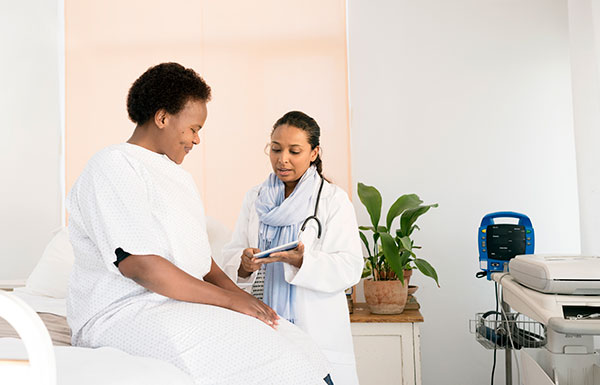Preparing for a hospital stay
When living with type 1 or type 2 diabetes, it’s important to be prepared for hospital visits. While diabetes can be managed successfully, other accidents or emergencies do happen. Even when a hospital visit is not related to your diabetes, there are certain actions that you need to take to avoid complications.
Talk to your care team
Prior to going to the hospital, reach out to everyone on your medical care team. This can include your doctor, surgeon, or anyone who is on your diabetes care team. Keeping your team informed can help you avoid potential complications.1 Some questions you can ask include:

- How will the times that I take my medication change?
- What should my blood sugar levels be before my procedure or surgery?
- Will someone at the hospital assist with my insulin injections?
- Will I be able to use my insulin pump and sensor when I am in the hospital?
Bring your supplies
Make sure to pack everything you need for your hospital visit. Here are some key items to remember:
- Your blood glucose meter: The hospital will likely be able to monitor your blood sugar, but it’s smart to pack your own just in case.
- Snacks or glucose tablets: Depending on how long you will stay in the hospital, it can be helpful to have snacks to keep your blood sugar in target range between insulin doses.
- Medical history and meal plan: Having a list that details your medical history can help hospital staff in providing you with the right care. A written meal plan can help hospital staff know what foods you eat at home to take care of your diabetes.
- Your medications: Hospitals do not always have every type of insulin or diabetes medication. Be sure to bring what you need to take care of your diabetes.
Inpatient vs. outpatient
Hospital procedures have two types of stays. If you are inpatient, that means that you will be in the hospital for longer than 24 hours. For an outpatient procedure, you may only stay in the facility for a couple of hours after your surgery. How you need to prepare for your stay can depend on whether you are inpatient or outpatient. Check with your care team to know if you will be inpatient or outpatient and to make sure you have everything you need.
Other considerations
Managing your blood sugar is always the most important goal. When you’re staying in a hospital, this can get tricky. Your blood sugar may be high from the stress and worry of your visit. Certain procedures or medications can also make your blood sugar level go up or down, so your diabetes medication may need to be adjusted.
Your meal schedule may also change. You may be used to eating at the same time most days. When you’re in the hospital, that’s not always possible. Having snacks on hand can help you keep your blood sugar levels under control and from going low.
You may also need take insulin intravenously (IV). Surgery can cause blood loss or dehydration, making it difficult for your body to absorb insulin via pump or injection2. An IV insulin solution that contains insulin may potentially be given to you during and after your procedure to maintain a healthy blood sugar level.
With the right preparation and talking with your care team, you can be ready for a more safe and comfortable hospital stay.
2. Guide to hospital stays. The Diabetes Canada Page. https://www.diabetes.ca/learn-about-diabetes/your-rights/hospital-stays. Accessed 17SEP2021
Looking for more tips? Join the list
Subscribe to our newsletter, News to Infuse, and receive monthly diabetes tips and helpful information.